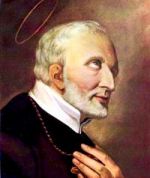Pope outlines plans for the extraordinary jubilee of mercy
April 13, 2015
Emphasizing the centrality of the Sacrament of Reconciliation and highlighting the importance of the corporal and spiritual works of mercy, Pope Francis has issued Misericordiae Vultus [The Face of Mercy], the bull of indiction of the extraordinary jubilee of mercy, which will begin on the feast of the Immaculate Conception in 2015 and conclude on the feast of Christ the King the following y ear.
“This is not the time to be distracted; on the contrary, we need to be vigilant and to reawaken in ourselves the capacity to see what is essential,” the Pontiff preached during the celebration of First Vespers of Divine Mercy Sunday in St. Peter’s Basilica. “This is a time for the Church to rediscover the meaning of the mission entrusted to her by the Lord on the day of Easter: to be a sign and an instrument of the Father’s mercy” (cf. Jn. 20:21-23).
“For this reason, the Holy Year must keep alive the desire to know how to welcome the numerous signs of the tenderness which God offers to the whole world and, above all, to those who suffer, who are alone and abandoned, without hope of being pardoned or feeling the Father’s love,” he continued. “A Holy Year to experience strongly within ourselves the joy of having been found by Jesus, the Good Shepherd who has come in search of us because we were lost. A Jubilee to receive the warmth of his love when he bears us upon his shoulders and brings us back to the Father’s house. A year in which to be touched by the Lord Jesus and to be transformed by his mercy, so that we may become witnesses to mercy.”
Citing Sacred Scripture, St. John Paul II’s encyclical on mercy, and “the great apostle of mercy, St. Faustina Kowalska,” Pope Francis reflected on mercy in his bull and discussed his plans for the year.
The significance of the beginning date, he said, is twofold. The feast of the Immaculate Conception “recalls God’s action from the very beginning of the history of mankind. After the sin of Adam and Eve, God did not wish to leave humanity alone in the throes of evil. So he turned his gaze to Mary, holy and immaculate in love (cf. Eph. 1:4), choosing her to be the Mother of man’s Redeemer. When faced with the gravity of sin, God responds with the fullness of mercy.”
He added that
I will open the Holy Door on the fiftieth anniversary of the closing of the Second Vatican Ecumenical Council. The Church feels a great need to keep this event alive. With the Council, the Church entered a new phase of her history. The Council Fathers strongly perceived, as a true breath of the Holy Spirit, a need to talk about God to men and women of their time in a more accessible way. The walls which too long had made the Church a kind of fortress were torn down and the time had come to proclaim the Gospel in a new way. It was a new phase of the same evangelization that had existed from the beginning.
In addition to the holy door at St. Peter’s Basilica and the indulgences that are typically offered during a jubilee year, the Pope directed that each diocese of the year take part in the jubilee.
There will be a holy door at the cathedral or another significant church in every diocese, as well as at major shrines.
In addition, on the Friday and Saturday preceding the Fourth Sunday of Lent, confessions will be heard for 24 hours in every diocese of the world.
“So many people, including the youth, are returning to the Sacrament of Reconciliation; through this experience they are rediscovering a path back to the Lord, living a moment of intense prayer and finding meaning in their lives,” Pope Francis said. “Let us place the Sacrament of Reconciliation at the center once more in such a way that it will enable people to touch the grandeur of God’s mercy with their own hands.”
The Pope also said that during the jubilee, he will send out special “missionaries of mercy,” priests “to whom I will grant the authority to pardon even those sins reserved to the Holy See”-- that is, certain excommunicable offenses listed in the Code of Canon Law such as the desecration of the Eucharist, the use of physical force against the Roman Pontiff, or a priest’s revelation of sins heard in the Sacrament of Penance.
“I ask my brother bishops to invite and welcome these Missionaries so that they can be, above all, persuasive preachers of mercy,” the Pope added. “May individual dioceses organize ‘missions to the people’ in such a way that these Missionaries may be heralds of joy and forgiveness. Bishops are asked to celebrate the Sacrament of Reconciliation with their people so that the time of grace offered by the Jubilee Year will make it possible for many of God’s sons and daughters to take up once again the journey to the Father’s house.”
For all current news, visit our News home page.
Further information:
- Pope Francis: Misericordiae Vultus (full text, English)
- Homily at First Vespers of Divine Mercy Sunday (scroll down for English)
- Celebration of First Vespers of Divine Mercy Sunday - 2015.04.11 (Vatican YouTube)
- Year of Mercy will be formally announced on Saturday evening, April 11 (CWN, 4/10)
All comments are moderated. To lighten our editing burden, only current donors are allowed to Sound Off. If you are a current donor, log in to see the comment form; otherwise please support our work, and Sound Off!







